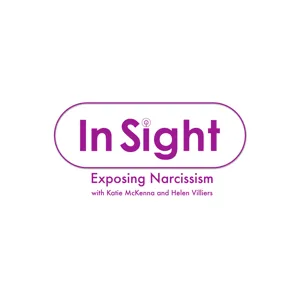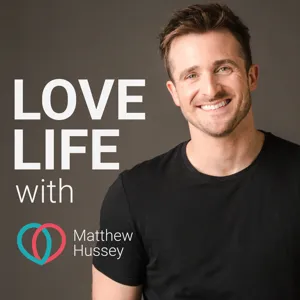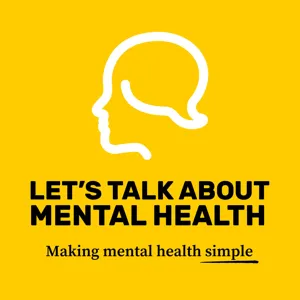Podcast Summary
Finding Balance and Recognizing Limitations: Communicate needs, challenge assumptions, and practice self-care to foster healthy relationships and avoid unnecessary conflict.
It's important to find balance in life and recognize our limitations, especially as we age. Katie shared her experience of feeling exhausted after attending a loud concert and how she used to push herself to say yes to every opportunity, even when she needed rest. She acknowledged the importance of communication and understanding in relationships, and how past experiences can influence our perceptions and actions. The conversation highlighted the importance of self-care, being honest about our needs, and recognizing that everyone's intentions are not always what we assume them to be. It's essential to challenge our assumptions and filter our experiences through a clear and unbiased lens to foster healthy relationships and avoid unnecessary conflict.
Creating a safe circle for open communication: Reacting judgmentally or shamefully can hinder open communication and lead to secrecy. Creating a safe space for sharing without fear of punishment promotes healthy relationships and growth.
When we react judgmentally or shamefully towards others, especially when they open up about their struggles or mistakes, we create an environment where they may feel unsafe to share in the future. This can lead to secrecy and cunning behavior. Instead, creating a "safe circle" where individuals can share without fear of punishment or shame can help foster open communication and healthy relationships. It's essential to understand the difference between consequences and punishments, as natural consequences are a result of one's actions, while punishments are intentional efforts to harm or control someone's behavior. By acknowledging our role in a situation and focusing on natural consequences, we can help promote growth and understanding, especially for neurodivergent children who may struggle with impulsivity and regulation.
Understanding Consequences vs. Punishment in Parenting: Recognizing the difference between consequences and punishment in parenting can lead to healthier emotional development for children. Use consequences as natural results of actions, avoid shame-inducing language, and create a safe space for learning and asking for help.
The use of consequences instead of punishment in parenting can lead to healthier emotional development for children. Consequences are a natural result of actions, while punishment is intended to provoke shame. By recognizing the difference and avoiding the use of shame-inducing language, parents can create a safe space for their children to learn and ask for help without fear of judgment or punishment. This approach not only benefits the child but also allows the parent to regulate their own emotions and respond effectively to their child's needs. By providing a supportive environment, children learn that it's safe to ask for help and that their parents will be there for them, fostering healthy emotional growth and resilience.
Learning Relationships from Environment: Children learn relationship skills from their surroundings. Healthy examples are crucial for emotional resilience and avoiding unhealthy dynamics later in life.
Children learn to form relationships based on the examples they see around them. If they grow up in unhealthy environments with inconsistent or abusive behavior, they may become hyper-independent or develop a skewed understanding of relationships. It's essential to teach them about healthy relationships and help them develop emotional resilience. The speaker's personal experience of vulnerability and the importance of showing them what healthy relationships look like can help them identify and avoid unhealthy dynamics in the future. The letter writer's experience of growing up in a dysfunctional family environment and the impact it had on their ability to form healthy relationships underscores the importance of this lesson.
Childhood experiences shape our adult relationships: Unmet childhood interests and traumas can impact our relationships and self-perception in adulthood. Societal norms and expectations can also influence our beliefs about relationships and worth.
Unmet childhood interests and traumas can significantly impact our adult lives, including our relationships and self-perception. The speaker shares her struggles with binge eating disorder, fear of conflict, and people-pleasing tendencies, which stem from her past experiences. In the realm of dating, she describes feeling more invested than her partners, leading to repeated heartache and feelings of loneliness. She's learned to be more open and vulnerable, but worries about getting stuck in a cycle. The speaker also reflects on how societal norms and expectations can shape our beliefs about relationships and our worth. Ultimately, she's on a journey to heal and learn to trust herself and others.
Childhood experiences shape trust and connections: Understanding past experiences and emotions can help us build deeper connections, rather than falling into cycles of hyper-independence and codependence.
People's past experiences and emotions can make it difficult for them to trust and connect with others, leading to a cycle of hyper-independence and codependence. The speaker's upbringing in an unpredictable and violent household instilled a deep sense of distrust and a need for control. This is manifested in her binge eating disorder, which provided a sense of control in a chaotic situation. In adulthood, she finds it challenging to distinguish between superficial similarities and genuine values and beliefs that form the foundation of deep connections. The fear of vulnerability and the desire for control can make it hard for her to fully trust and let people in. It's crucial to recognize the importance of creating meaning and understanding the underlying emotions and experiences that shape our relationships.
Control and safety as human needs: Historically, control of women's sexuality has maintained power structures, while lack of safe touch can lead to intense cravings for intimacy in adulthood. Recognize roots of desire for control and find healthy ways to meet needs.
Control and safety are fundamental human needs, often sought through various means such as religion, routines, or relationships. However, these desires can lead to harmful consequences, particularly when they are used to exert power over others, especially women. For instance, in religious contexts, the control of women's sexuality has historically been used to maintain patriarchal power structures. Additionally, the lack of safe touch and emotional connection during childhood can lead to intense loneliness and a craving for physical intimacy in adulthood. It's essential to recognize the root causes of our desire for control and find healthy ways to meet our needs while respecting the autonomy and dignity of others.
Forming healthy relationships requires open communication: Being hyper-independent or a people-pleaser can hinder healthy relationships. Communicate openly, share needs, ask for support, and be vulnerable to build stronger connections.
Both hyper-independence and people-pleasing can hinder us from forming healthy, connected relationships. Hyper-independence can leave others feeling disconnected and unsupported, while people-pleasing can suffocate and isolate partners. The fear of vulnerability and the need to protect ourselves can lead us to avoid expressing our needs and asking for help, making it difficult for others to truly connect with us. This is a common issue for those growing up in trauma environments and can manifest differently in each person. It's essential to be aware of these patterns and make a conscious effort to communicate openly and honestly in relationships. This means sharing our needs, asking for support, and being vulnerable, even if it means the risk of rejection. It's also crucial to recognize when our partners are not meeting our needs and address the issue early on in the relationship. By doing so, we can build stronger, healthier connections with others.
Listening carefully to others' self-expressions in relationships: Recognize the importance of understanding partners' words and actions to build authentic relationships, acknowledge their desires and intentions, and challenge limiting beliefs.
People often ignore or disregard what others tell them about themselves in relationships, leading to potential harm and misunderstandings. This can manifest in various ways, such as a partner repeatedly expressing their lack of commitment or emotional abuse, where the abuser uses their words to silence their partner. It's essential to listen carefully to what people say about themselves, as their actions and words can provide valuable insights into their character and intentions. This includes acknowledging their desires, past behaviors, and honest intentions, even if they don't align with our own expectations or desires. By truly listening and understanding, we can make more informed decisions and build healthier, more authentic relationships. Additionally, it's crucial to recognize and challenge any limiting beliefs or narratives we hold about relationships, which can cloud our judgment and lead us to make poor choices.
Struggling with feeling worthy of love: People who've experienced unhealthy relationships or upbringings may feel unworthy of love and communication in relationships, leading to a distorted belief that asking for clarity is greedy. Open communication about expectations and feelings is crucial.
Many people, especially those who have experienced unhealthy relationships or upbringings, struggle with feeling worthy of love and communication in their relationships. This stems from being taught as children that love and attention must be earned, leading to a distorted belief that asking for love or clarity in a relationship is greedy or demanding. The balance should be tipped towards the giving parent or partner, but when it's not, individuals may feel disconnected and invisible. It's crucial to recognize these patterns and communicate openly about expectations and feelings in relationships.
Clear communication is crucial in dating: Be upfront about intentions and desires, ask for the same, acknowledge past experiences, and seek self-awareness for healthier relationships.
Clear communication is essential in dating. Being upfront about personal intentions and desires, as well as asking the same of potential partners, can save time and prevent misunderstandings. Fear of appearing desperate or needy should not prevent us from seeking clarification and setting boundaries. Additionally, self-reflection and recognizing personal growth are important in building healthy relationships. It's essential to acknowledge past experiences and take responsibility for our actions in past relationships. Asking questions like "what did you learn about yourself from your last relationship?" and "how would your ex-partner describe you as a partner?" can help foster self-awareness and growth. Ultimately, being honest and intentional in our dating experiences can lead to more fulfilling relationships.
Understanding our exes reveals insights about ourselves: Recognize healthy connections and respect boundaries while revealing vulnerable parts of ourselves in relationships.
The way we behave in relationships and how we perceive our exes can reveal a lot about ourselves. When asked how an ex would describe us, the response can indicate if someone is dismissive or respectful. This exercise is not about trauma dumping but about understanding boundaries and self-expression. The hyperindependent type, who has been used to guarding themselves, may find it challenging to open up and reveal vulnerable parts of themselves. It's essential to recognize when we're connecting through shared experiences rather than trauma. A healthy relationship forms through playful connections, where both parties meet as equals and reveal themselves in a genuine way. The example of Keanu Reeves and Sandra Bullock's relationship in the film "Speed" illustrates this concept of age-appropriate and healthy dating. However, it's essential to remember that everyone's experiences and healing journeys are unique, and what works for one may not work for another.
Focusing on shared experiences for bonding: Instead of forming relationships based on shared trauma, focus on playful and lighthearted shared experiences to build stronger connections and foster mutual respect and understanding. Healthy relationships involve open communication, respect for autonomy, and a willingness to learn from each other.
Forming a relationship based on shared trauma may not be the healthiest choice as it primarily validates the shared experience and may distract from discovering each other's actual values, interests, and belief systems. Instead, focusing on playful and lighthearted shared experiences can help build stronger connections and foster mutual respect and understanding. Healthy relationships involve open communication, respect for autonomy, and a willingness to learn from each other, even when opinions differ. By engaging in meaningful discussions and avoiding contempt, individuals can form strong bonds that last a lifetime. Ultimately, the key to a successful relationship is to focus on the positive, shared experiences and values, while respecting and appreciating each other's unique perspectives.
Value yourself and don't waste time on unreciprocated relationships: Invest in self-discovery, prioritize your time and energy, and don't be afraid to ask for your needs to be met in relationships.
In relationships, it's important to value yourself and not waste time on those who don't reciprocate. If a relationship isn't easy at the start, it likely won't get easier. Instead of waiting for someone to prove their interest, take control and make alternative plans. Establishing clear communication and boundaries is crucial. People often fear discovering that their hopes aren't met, but finding out sooner rather than later can save time and energy. Life experiences, including personal growth, play a significant role in helping us understand our values and needs in relationships. Therefore, invest time in self-discovery and don't be afraid to ask for your needs to be met. Remember, it's essential to prioritize your own time and energy in relationships, as they should be a source of growth and mutual respect.
Discovering compatibility through disagreements on a first date: Disagreeing on a first date can reveal important information about someone's attitude towards your opinions. Be mindful of their reaction, as dismissive behavior may be a red flag. Focus on meeting people in person and keep an open mind to increase your chances of finding a relationship.
Disagreeing with someone on a first date can reveal important information about their attitude towards your opinions. However, it's essential to be mindful of the fact that not every disagreement is a deal-breaker. If they respect your viewpoint and continue the conversation, it's a good sign. On the other hand, if they dismiss your opinion or change theirs to mirror yours, it may be a red flag. Another crucial takeaway is to avoid getting too invested in dating apps, as they can lead to unhealthy patterns of dopamine and oxytocin release. Instead, focus on meeting people in person as soon as possible and getting to know them through brief, casual conversations. And remember, the success rate of finding a relationship through dating apps is relatively low, so it's essential to keep an open mind and meet multiple people. In summary, disagreements on a first date can provide valuable insights, but it's essential to be mindful of the reaction. Dating apps can be addictive, so focus on meeting people in person and keep an open mind.
Approach to dating apps impacts experiences: Approach dating apps with fun and authenticity for fulfilling experiences, regardless of app's reputation for casual or serious encounters.
The mindset and approach people have towards using different dating apps significantly impacts their experiences. While apps like Tinder are often seen as more casual and fun, apps like Match.com, Bumble, and Plenty of Fish are perceived as more serious and relationship-focused. However, this distinction can lead to unnecessary pressure and projection on the matches, potentially hindering authentic connections. Instead, it's essential to approach all dating apps with a mindset of fun and authenticity, allowing for the possibility of both casual encounters and meaningful relationships. By recognizing and challenging our own projections and biases, we can create more fulfilling and less exhausting dating experiences.
Authenticity in Relationships: Be true to yourself and prioritize relationships where you feel seen and heard. Authenticity attracts kind and caring partners and validates self-worth.
It's essential to be authentic and fully ourselves in relationships, rather than trying to meet rigid expectations or hide our true selves. This not only helps us attract kind and caring partners but also validates our self-worth. Anyone who doesn't make an effort to get to know us genuinely is not worth our time. We should prioritize relationships where we feel seen and heard, and this includes friendships as well as romantic relationships. Peeling back the layers of vulnerability with safe people can help us grow and become more comfortable sharing ourselves with others. Remember, we are worthy of genuine connection and should not blame ourselves for past experiences or perceived failures. Instead, we should focus on building healthy relationships based on mutual respect, understanding, and compassion.
Being vulnerable leads to growth and healing in relationships: Vulnerability in relationships takes courage, but it can lead to positive changes and meaningful connections.
Being vulnerable and authentic in relationships, even when it feels scary or difficult, can lead to growth and healing. It's important to recognize that healthy relationships exist and to be open to forming them, even if it means stepping out of your comfort zone. Vulnerability requires courage, but the rewards can be significant, leading to positive changes in various aspects of life. Remember, healthy relationships are out there, and they can come from unexpected places. Embrace the opportunity to be vulnerable and build meaningful connections with others.
The Power of Authenticity and Unexpected Connections: Embrace authenticity to make meaningful connections and inspire others, even in unexpected places like social media
Key takeaway from this podcast episode is the power of authenticity and the positive impact it can have on others. Helen and McKenna expressed their gratitude towards each other for inspiring them to be their true selves, which in turn encouraged those around them to do the same. This authenticity has significantly changed their lives. It's a reminder that being true to ourselves can lead to meaningful connections and have a ripple effect on those around us. The podcast episode also highlights the unexpected places where we can meet people who can have a profound impact on our lives, like on TikTok. Overall, the message is to embrace who we are and the unexpected connections we make along the way. Thank you to our sponsors, Pinch of Nam and Boston Nail House, and to all the listeners, especially the Patreons. Take care and bye. This podcast has been edited by Sam Atkinson.






